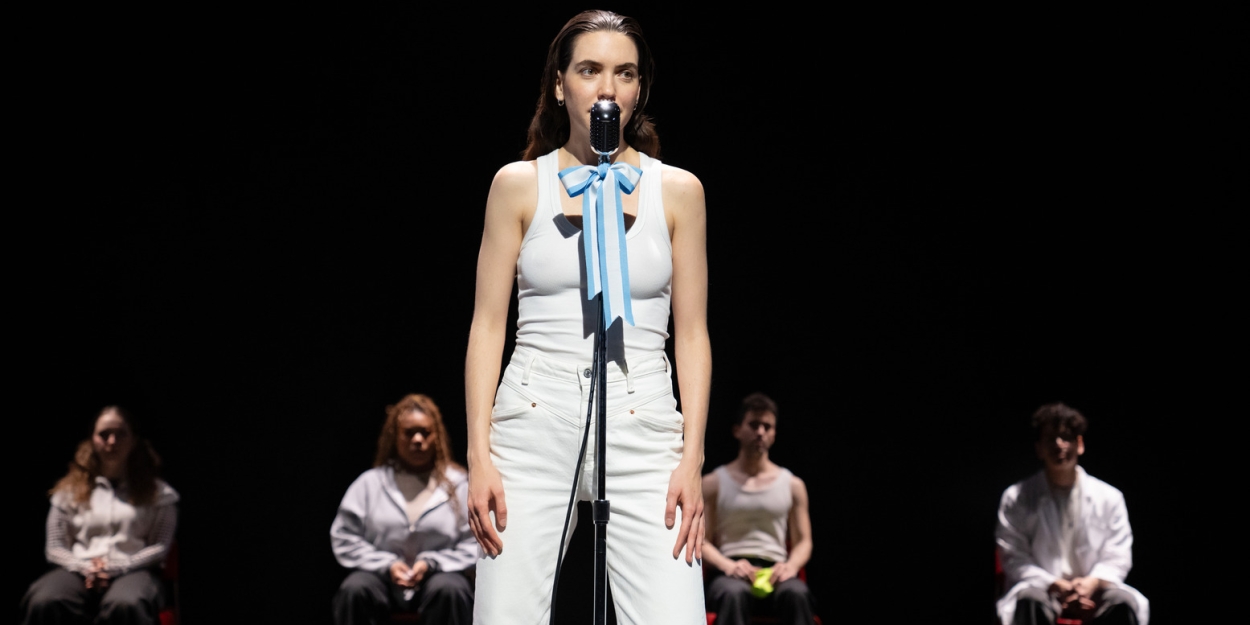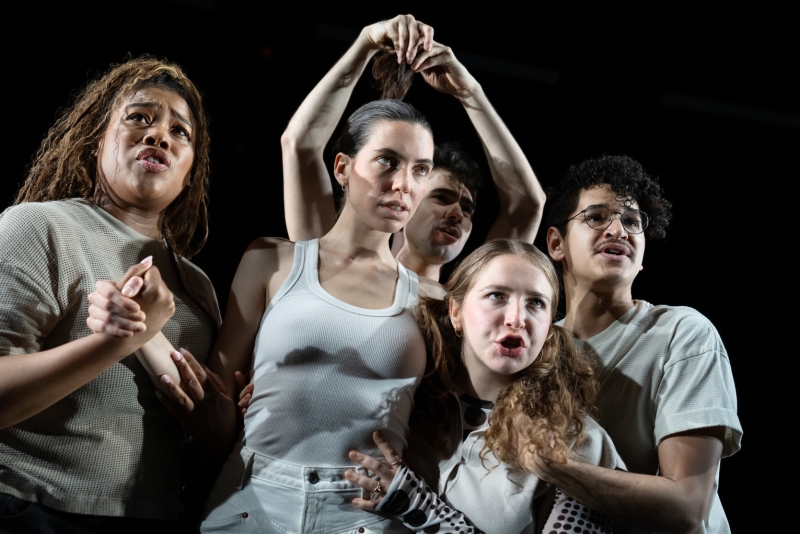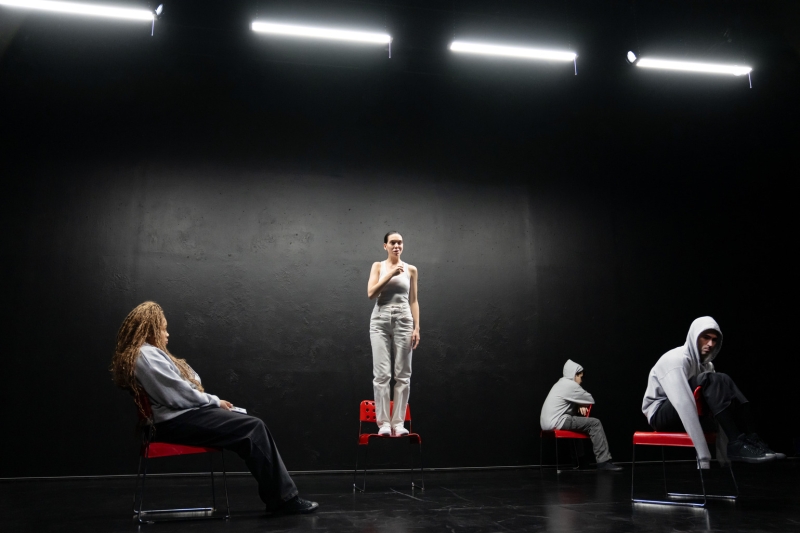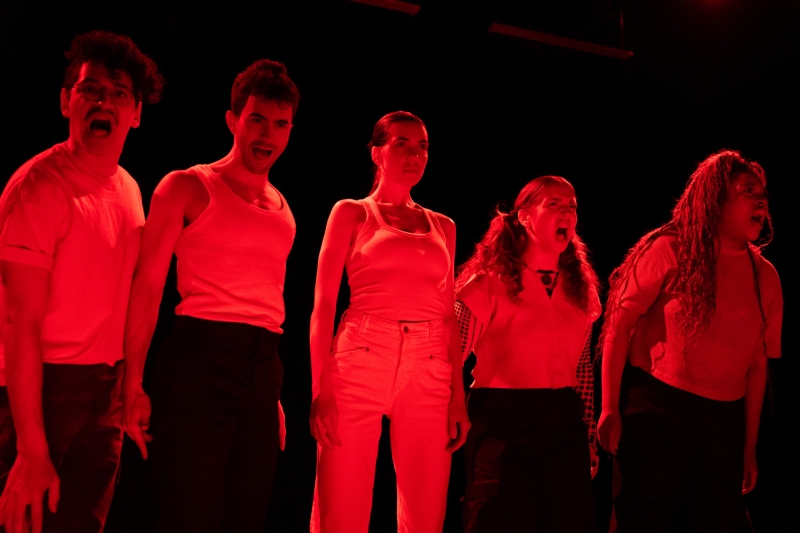Interview: Maia Novi on the Avant-Garde, Unapologetic & True Story of INVASIVE SPECIES
Novi shares what inspired her to write this play, how Invasive Species has been making a splash on social media and resonating with young artists, celebrities and more.

Invasive Species is a groundbreaking play that delves into the true story of its playwright and star, Maia Novi. When a series of miscommunications lands Novi in a youth psychiatric ward, Maia's journey becomes a poignant and darkly humorous exploration of cultural shock, language barriers, and mental health.
Now running at The Vineyard’s Dimson Theater to June 30, this limited engagement, directed by Pulitzer Prize finalist Michael Breslin and executive produced by Jeremy O. Harris, reunites the cast from its 2023 production at The Tank, including Maia Novi, Raffi Donatich, Sam Gonzalez, Alexandra Maurice, and Julian Sanchez.
BroadwayWorld spoke with Maia Novi about what inspired her to write this play, how Invasive Species has been making a splash on social media and resonating with young artists, immigrants, and celebrities, it's accessable ticket initiative, and more.
Invasive Species is based on a true story. What inspired you to take your experience and put it down on paper?
In 2022, which was my final year of drama school at Yale, I was involuntarily admitted to the psych ward. There were several factors that were added to that happening, one of them was a language barrier- because I’m from Argentina- cultural shock, inability to express. I was having a lot of insomnia and I went to see a psychiatrist. An inability to actually express what was going on in my head in English led to a weird sort of miscommunication, and they told me they would keep me in observation for the night. They were like, “Okay, we can help you with the insomnia, we’ll give you this sleeping pill, keep you in observation, see if it works, and if it works, great, you’ll get to go home tomorrow with a prescription.” And I woke up and I wasn’t in the same hospital. I had been transported in my sleep, in an ambulance, to the psychiatrist youth ward. Really crazy. That’s why people come see the play and they’re like, “Is that real? Because it sounds like a movie.”
I was put in a youth ward, a psychiatric hospital for children, which was so bizarre because I was 25 years old at the time. I am 27 now. I was there for a long time, and I couldn’t use the phone, couldn’t talk with anyone. My husband didn’t know where I was because I had disappeared from the radar and I was suddenly in a different place than he thought I was, and nobody was giving him an explanation. It was like being trapped in a jail in a way. But I was with children. And I got to really get to know these children and learn from them. And in a way the world of the psych ward felt more sane than the world outside that had led me to reach this level of anxiety—the pressures of drama school, being an immigrant, being in another country...
I had diary entries, all I could do was write, because there was nothing to do. There were puzzles, and children’s books, coloring books, because everyone was so young, the kids were 13 to 16. And then there was me. And the kids were like, “You’re so old, what are you doing here?” And the doctor that had put me in there had left for spring break, so nobody knew how to talk with him, or why they had transported me there. And the medication they were giving me, they were not giving me any explanation of what it was.
And then I got discharged, I graduated, and I was in the world with this stack of papers that I had written. My husband was like, “You need to process all of this, take a couple of weeks, even a month off if you need, after school, to write and process.” And with the diary entries I started building this play. And suddenly it was real. There was all this dialogue I had listened to. All these real people were suddenly these really profound, rich characters, and these kids had so much wisdom. And the play was so funny even though the situation felt so scary.

How does it feel for you as an artist, and also just as a human being, to have a story based in your truth play out in front of audiences every night?
At first my biggest fear was, it feels so personal and specific to my real life that maybe people won’t identify, won’t feel empathy, won’t get it, or even think it’s indulgent. My sense of humor is also very Latin American, I have a very dark sense of humor, and I was like, ‘Will an American audience get it?” So that was my initial fear. But then people really responded to it in a way where strangers, mostly young people, young artists, but even older audiences, a wide range of people felt they identified with this. I think there is a mental health pandemic right now. And people did really relate to it, and were very moved and laughing. I think the specificity, to tell something specifically to you, will still be relatable to other people if it’s grounded in truth.
On the other side, it is sometimes a little scary to walk out of the theater and have people that I don’t know feel like they know me so well. I’ve had people talk to me and be like, “We are connected, I feel like I know you so well.” And that’s vulnerable because it’s like, ‘You don’t know me, you know a little part of my story, but this is theatre.” It’s a double-edged sword in a way.
Michael Breslin, who is the director, was the person who told me, “Listen, your brain goes so fast, you have such an inherent manic writing style, it’s so exciting, it moves like thunder, it’s so unapologetic, it’s so angular. Don’t step away from that.” It was all these people around me that care about me, Jeremy O. Harris, my husband, the producers being like, “Let’s keep this authentic. Do not be afraid because it’s a commercial run that you suddenly have to spoon feed audiences.” Because a lot of theatre that I watch that I don’t like spoon feeds audiences, and that happens in film as well. And this play will not spoon feed you, it will make you have to fill the gaps.
The show blew up on TikTok, and you have had some very famous supporters of the show. What has been going through your mind at the incredible response to Invasive Species?
I’m just like, “Wow!” The success of this play, the buzz - buzz, you can’t buy it, it just happens organically. I think the buzz, all these celebrities, and the TikToks, and how well it has been received has to do with this very credible universe that we’ve built. The version at The Tank was the first iteration of this play. This was all very recent. We hustled to put that up with $10,000 in donations that we fundraised online. No money, no time, nine days of rehearsal. We didn’t have enough money with $200 dollars of budget for marketing, we shot all these really artistic videos that looked like short films of the play. Theatre marketing sometimes doesn’t feel artistic, sometimes it does, but most times it doesn’t, so we were like, “Let’s make it as artistic as the play.” We then rendered this logo of Invasive Species that you now see on all these hats, and then suddenly we have all these celebrities wearing the hats, and we were creating a brand, a universe, that just ripples out the textures of the play in a way that goes beyond the play. The play is just the center of this giant broccoli of a universe we created.
Michaela Coel coming to see it, she’s someone that I really look up to. She told us, “I was a drama school freak. I was not getting any parts when I graduated, so I wrote something for myself." And she loved it. She was so impressed with the ensemble work and the writing. That to me, was unexpected. And I could have never imagined this happening a year ago when we had a scrappy run. I had zero legitimacy. Bringing people to the theatre when no one knows who you are and you haven’t written anything is so hard. And I was sticking flyers by hand in the street, giving them out, going to Latin American restaurants, trying to get Latin American people to the theatre. Because the play is also, in part, for them. And that’s sort of like my target audience. And the hustle suddenly was giving its fruits, and it felt so good. And it was so satisfying.
And how did it feel to reunite with the cast and creative team from The Tank for this Vineyard Theatre run?
The level, the surgical genius level at which Michael Breslin and Amauta [M. Firmino], who is the dramaturg, were able to dig into the play and find a way to, in not that much rehearsal time, build a machine... because that’s what the play is, it’s a machine. It moves fast, it’s aggressive. It also has its moments that are very touching, but the machine they built that started at The Tank got only tighter, and sleeker, and more efficient, and more impactful at The Vineyard because, again, with a little bit more resources you can heighten, and allow the actors to really shine.
These actors are playing five roles, at least, each. They transform in the beat of a second, from a director to a bug, to a teen in a psych ward, to my parents, to an evil agent, to a psychiatrist, to extensions of my brain. That was a gift I also wanted to give to the actors, because I wanted everyone to have their moment, and I wanted to treat these children that I met in real life with so much respect. So being at The Vineyard felt like getting into the literal Olympics. People walk out of the theatre and they’re like, “Are you not exhausted?” because it’s so physically and emotionally demanding. And I’m like, “No,” because Michael directed it in a way that allows us to feed from each other’s energy constantly. We’re always in this amoeba of energy together.

The show launched a ticketing initiative to make the show more accessible to all audiences. Can you tell me a little bit about that?
The people that come out of the show in tears are young, or artists, or Latinos, or immigrants, or international students, or people that have worked in the entertainment industry and have really felt the sort of violence of it, in a way. People reaching out in DMs are people who are young, Latinos, and immigrants, and they’re all like, “I want to come again and bring my family, I just can’t afford it.” The play is not built for the regular commercial theatre-goer that goes to see whatever Broadway shows and musicals. That’s not the audience we’re targeting, and that’s not the audience that fuels the play, or needs to see it, or needs to be seen in it. The people that are reaching out and being like, “I’ve never felt more seen on stage,” they’re all young, mostly, and I don’t want those people to be left out of the theatre because they can’t buy it. Because the demand is huge. I am literally getting hundreds of DMs from strangers that are like, “How can I bring my friends? Can I get a group discount code? I want to see it again. I need my parents to see it again. They’re immigrants, they’ll resonate with it,” So, the producers, they really tried to push for this initiative, because they were seeing, “Oh, shit, the audience that really gets it can’t afford it, but they love it! So let’s make it happen for them!”
I’ve seen bilingual Latinx-centered theatre, I’ve seen a lot in the city that relies on stereotypes a little bit. And this play is sort of an intersection of Latinx theatre with the grotesque, the bizarre, the avant-garde, the unapologetic, the freaky. A lot of Latinx folks came to me, being like, “I want to see my identity, I’m also a freak. I want to see theatre that can allow my identity and my story, which also resonates with yours, Maia, as an immigrant, to also be freaky, and unapologetic, and funny, and full of contradictions, and not likable at times." That is special to me. There is a demand for theatre that creates a cultural impact. And this I think is the biggest success for me. What matters is I feel like we’ve created a cultural impact. Seeing strangers wear the Invasive hat in random parts of the city is so crazy and cool!
At the end of the day, what do you hope that audiences take away from the show?
I want people to allow themselves to be seen by the play, and if they don’t, to be able to think of people in their community that maybe had had a similar experience of struggling to assimilate, of struggling with mental health to a degree that actually can feel unsustainable in this country specifically. If people can see the play and reach out to a friend who has maybe had a hard mental health moment, to be like, “Hey, how are you?” If people do see themselves in the play, to be able to tell their friends, and hopefully to create this snowball effect that will allow theatre in New York to open the doors to writers that are first-time writers. Because The Tank was the only space. I applied to every theatre residency in New York City, and everyone was like, “Sorry, you don’t have enough credits, sorry you don’t have enough on your resume, sorry this play is too weird, sorry it doesn’t feel like a real play, it’s more like a meditation.” First-time career artists and writers who are young and are trying to tell their story, it’s actually really hard. The Tank is the only space right now that is doing it, and they can’t do it for everyone. That would be the dream to me, more spaces like the Tank to open their doors to early career artists.


Videos

